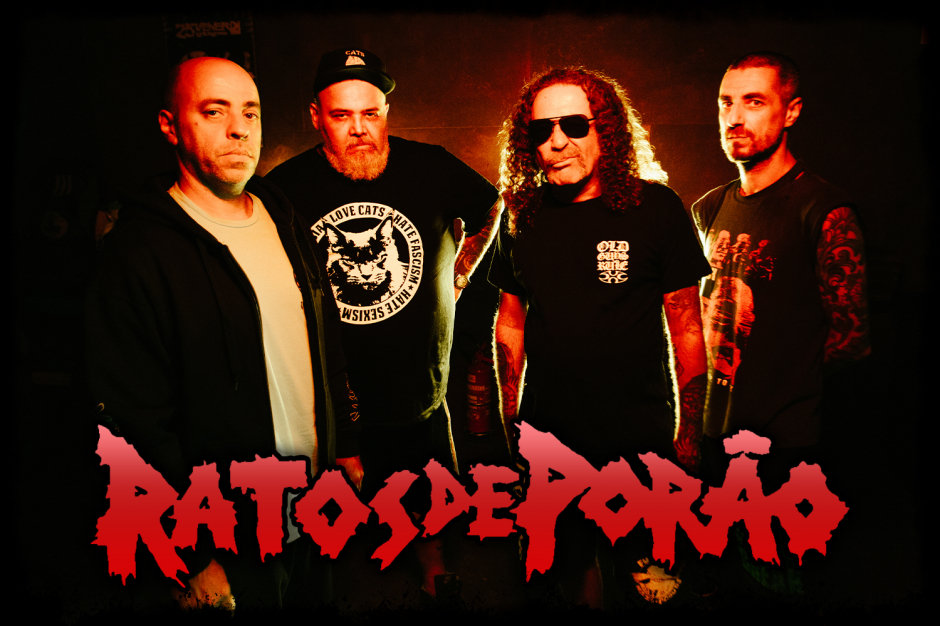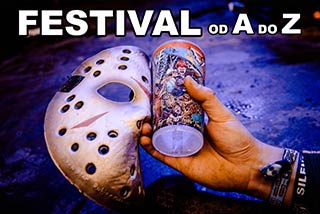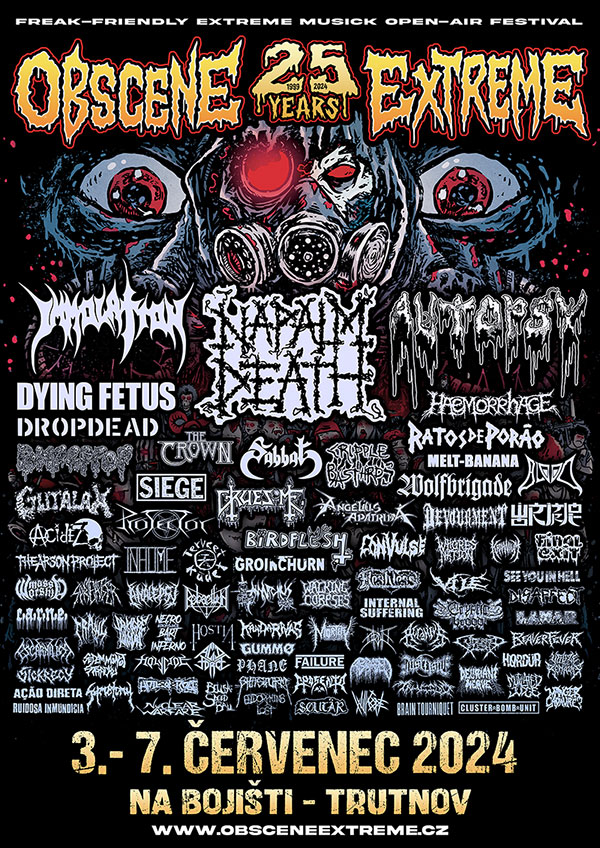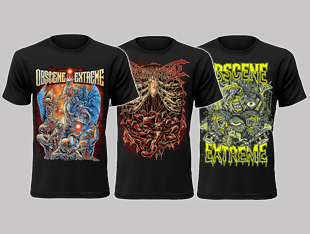RATOS DE PORAO Brazil
RATOS DE PORAO - La Crocodila
Info / Bio / Diskografie / Video / Komentáře
Info
POSLEDNÍ ÚTOK BRAZILSKÝCH KRYS!!! Další kurva silný kalibr pro výroční Obscene Extreme!!! Po čtvrté a naposledy nám tyto legendy světového hardcore/thrash crossoveru přijedou ukázat, jak se to opravdu dělá!!! Mluvíme pochopitelně o nikom jiném než RATOS DE PORAO, bandě, která je na světě od roku 1981, ovlivnila hromadu extrémních kapel po celém světě a nejen tímto si svůj status legend opravdu zaslouží. Zuřivost, kterou mají RATOS DE PORAO ve své muzice, je přesně to, co známe od kapel z Latinské Ameriky.
Takto to prostě nikdo jiný neumí a my jsme velmi rádi, že si RATOS DE PORAO vybrali OEF pro vystoupení k jejich avizovanému POSLEDNÍMU evropskému tour vůbec. Jsou totiž velkými fanoušky festivalu a to nás opravdu těší. Tak nepropásněte šanci vidět tyto chlapy ještě jednou, protože tyto crossoverové krysy možná už ze sklepa nikdy nevylezou!!!
Bio
Ratos de Porão, or simply RxDxPx, was formed in November 1981, existing in the Brazilian (São Paulo city) punk rock scene (alongside bands such as Olho Seco, Cólera, Inocentes, Garotos Podres, and Lobotomia). Directly influenced by the UK 82 hardcore bands such as Discharge, G.B.H., Varukers and Swedish and Finnish bands such as Anti-Cimex and Kaaos, they started to write songs that criticized Brazilian society, a revolutionary concept at the time. Their sound is regarded as one of the rawest of their scene (because other bands such as Cólera and Garotos Podres were more 'punk rock' sounding than 'hardcore').
Their first album was released in 1983 and was titled Crucificados pelo sistema. Released on the Ataque Frontal label, it was one of the fastest selling hardcore albums to come out of the country, and was soon considered a punk classic worldwide. The line up was João Gordo (vocals), Mingau (guitar - later in many punk and pop bands in Brazil), Jabá (bass) and Jão (drums). Soon after, with the fall of the São Paulo punk scene (because of associated gang violence), the band split up and since then João Gordo has been accused of selling out and betraying the DIY ethics of the punk movement for several alleged reasons; he has said, "I'm a traitor since 1983, because I told the guys I played hardcore, not punk. Then, I got labelled.(...)That's a stigma".
Initial crossover thrash era
In 1985, RxDxPx came back, but with a different line up and sound. They brought thrash metal to their music, influenced by bands such as Slayer, Exodus, Kreator and hardcore bands around the world that were also transitioning to a more thrash metal sound, like Suicidal Tendencies, D.R.I., English Dogs, Cro-Mags, Agnostic Front and others (including Brazilian bands such as Lobotomia and Armagedom). Jão switched over to playing guitar, and an old punk named Spaghetti (who later adopted a thrash metal sound) replaced him on drums. Subsequently, they released the Descanse Em Paz album on Baratos Afins.
With their new sound, they began to associate more with heavy metal bands, becoming friends with longtime RxDxPx fans Sepultura and other bands of the Brazilian 1980s metal scene, including Korzus and Anthares. Their next studio release with Baratos Afins Records, 1987's Cada Dia Mais Sujo e Agressivo, was also released in an English-language version (Dirty and Aggressive) (the band feared that their English was so grammatically inaccurate that many of their native English speaking fans might ridicule their translated lyrics). This release continued the band's D-beat drum tempos.
In 1989, they signed to Roadrunner Records at the urging of Igor Cavalera of Sepultura, who played one of the band's tapes for the label's executives. RxDxPx then went to Germany to record their next studio LP, Brasil. With Harris Johns of Voivod and Tankard producing, the band's production quality improved substantially in contrast to their previous releases; the instrumentation was noticeably more technical.
In 1990, they returned to Germany to record their last album with the 'classic' line-up of João Gordo, Jão, Jabá and Spaghetti. With Harris Johns acting again as producer, their next album titled Anarkophobia was met with criticism by some fans for being the band's most metallic release to date, having considerably more complex and lengthy song compositions and more technical musicianship. Nevertheless, Anarkophobia increased their profile within the worldwide metal scene of the early 1990s.
But in mid-1991, they had their first line-up change in years, with Spaghetti leaving the band, citing that he had "been tired of the musical life". They auditioned several drummers to replace him, including Beto Silesci from Korzus, but the band decided that Silesci's style was too metal for the new direction they were planning to pursue. Silesci was in turn replaced with Boka of the Santos Beach thrash/death metal band Psychic Possessor. In 1992, RxDxPx released its first official live album, called Ao Vivo, with a corresponding music video for the song "Aids, Pop, Repressão" receiving heavy air play on Furia Metal of MTV (the Brazilian equivalent of Headbanger's Ball).
At the decline of the thrash scene, under tension and personal problems (Jabá left the band and they had a heavy drug problem), they entered into the studio in 1994 to record their only 'all lyrics in English' album, called Just Another Crime In Massacreland. The album suffered a thin production and a low promotion by the label, and it was a hard time in the life of RxDxPx.
Return to punk rock and hardcore
After the departure of Jabá, the band had several different bass players and recorded a studio album with only punk and hardcore covers called Feijoada Acidente?, a play on the Guns N' Roses album The Spaghetti Incident?. (Feijoada is a traditional food from Brazil, a stew based on beans and pork.) There were two versions of this album: one covering only Brazilian bands such as Olho Seco, Lobotomia, Garotos Podres, among others; and one covering only non-Brazilian bands such as G.B.H., Black Flag, Anti-Cimex, Minor Threat, among others. At this time, Walter Bart (who used to play in a punk band called "Não Religião") and "Pica Pau" (Portuguese for woodpecker), who stayed in the band until 1999, played bass.
Released in 1997, Carniceria Tropical marked a return to hardcore and Portuguese lyrics, and the band regained their former success. The same year, João Gordo started to work as a VJ for MTV Brasil.
In 1999, the bassist Cristian "Fralda", who used to play in the punk rock band "Blind Pigs" joined the band, and they entered into the studio to re-record their first album, and called this album Sistemados Pelo Crucifa (a play on the original album title, "Crucificados Pelo Sistema"). The front cover was designed by the Korzus bass player Dick.
Return to Crossover
In 2002, they released the Onisciente Coletivo album, and came back to be more friendly with thrash metal, mixing the 1980s with 1990s faces. The bassist Cristian "Fralda" left to join the old hardcore/crossover/thrash band Lobotomia. In his place entered an old underground musician, the bass player Paulo Júnior, who still plays with his hardcore band called "Discarga" and guitarist of "Point of no Return".
In 2006, they released Homem Inimigo Do Homem.
On August 13, 2013, Ratos de Porão announced on their Facebook page that they were working on a new album. Entitled Século Sinistro, the album was released on May 27, 2014.
Discography
| Datum vydání | Název nahrávky | Média |
|---|---|---|
| 2023 | Al Kasal | LP |
| 2022 | Necropolítica | |
| 2014 | Século Sinistro | |
| 2012 | No Money, No English | |
| 2010 | Ratos De Porao / Looking for An answer | |
| 2006 | Homem Inimigo do Homem | |
| 2003 | Ao vivo no CBGB | |
| 2002 | Onisciente coletivo | |
| 2001 | Guerra Civil Canibal | |
| 2000 | Sistemados pelo Crucifa | |
| 2000 | Só crássicos | |
| 2000 | South America in Decline | |
| 1999 | Periferia - 1982 | |
| 1997 | Carniceria Tropical | |
| 1995 | Feijoada Acidente? - Brasil | |
| 1995 | Feijoada Acidente? - International | |
| 1994 | Just Another Crime... in Massacreland | |
| 1992 | RDP ao vivo | |
| 1991 | Anarkophobia | |
| 1989 | Brasil | |
| 1989 | Sanguinho Novo... Arnaldo Baptista Revisitado | |
| 1987 | Cada Dia Mais Sujo e Agressivo | |
| 1986 | Descanse em Paz | |
| 1985 | Ataque sonoro | |
| 1985 | Ratos de Porão/Cólera ao vivo | |
| 1984 | Crucificados pelo Sistema | |
| 1984 | World Class Punk | |
| 1982 | Sub | |
| 1982 | O começo do fim do mundo |






